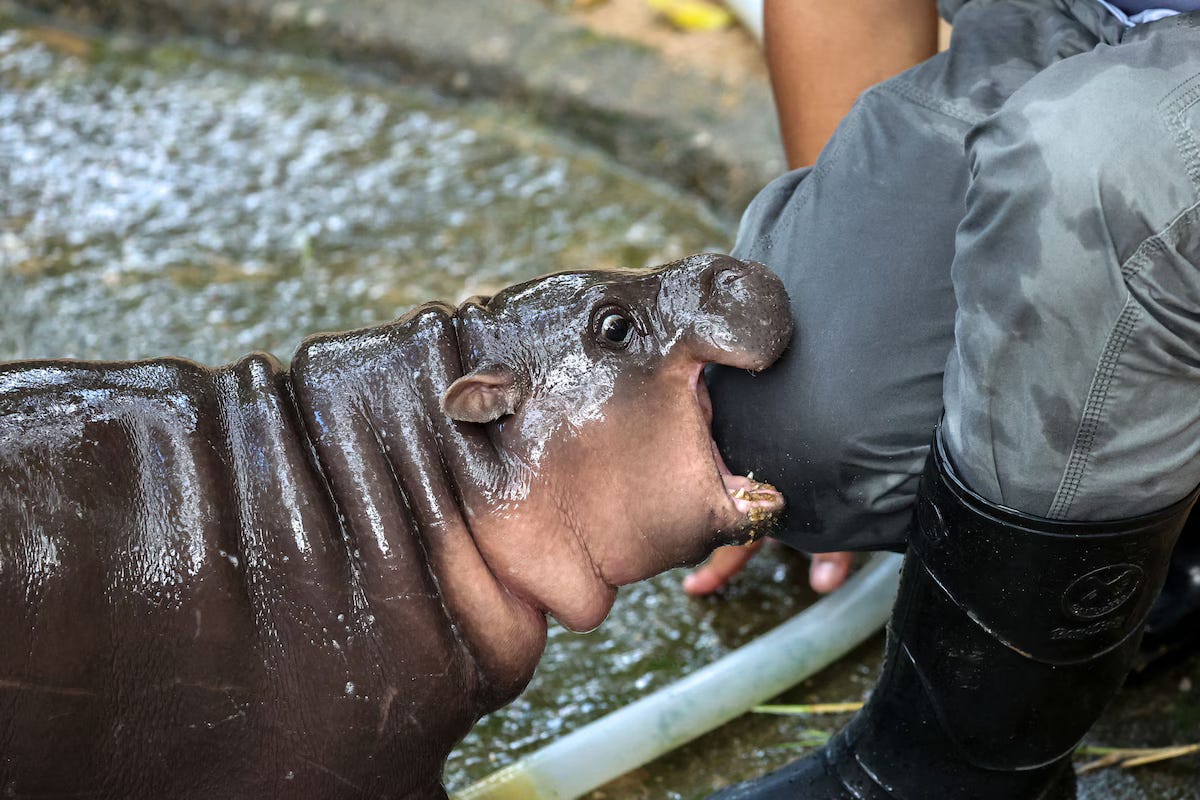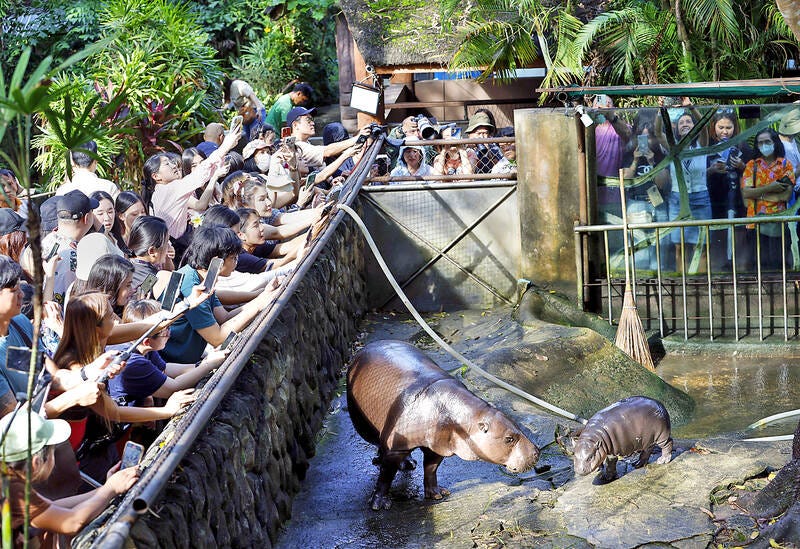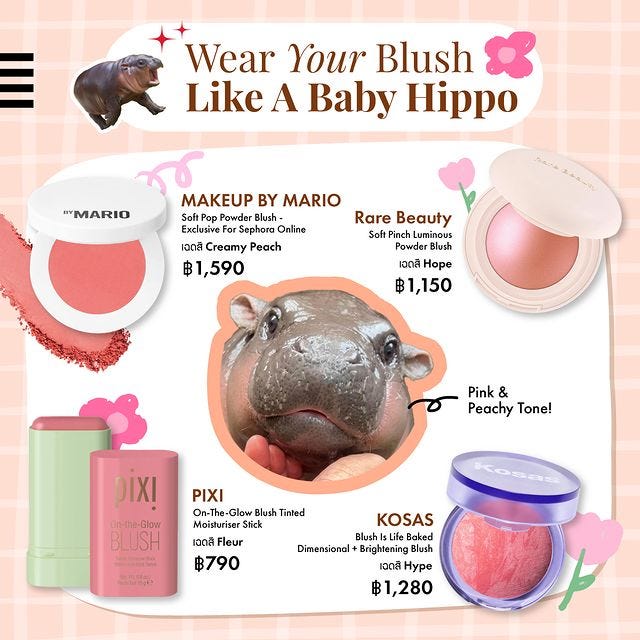How Moo Deng Became a Superstar
Whether it's Lionel Messi, Beyoncé, or a baby hippo, the economic principles remain the same.

An unlikely star has emerged in a crowded Thai zoo —a baby pygmy hippo named Moo Deng. Born in July 2024, this tiny, gray, and perpetually moist creature has captivated the world and generated millions of views on TikTok. She’s also inspired everything from latte art to viral makeup trends mimicking her famously rosy cheeks. Yet, beneath the viral cuteness and her internet fame lies a fascinating economic story.
Sherwin Rosen’s landmark theory of the “economics of superstars” has traditionally offered a framework that can be used to explain the outsized fame and earnings of athletes, entertainers, and musicians. Moo Deng’s journey to stardom also fits neatly into this model. While there are a few thousand pygmy hippos around the world, Moo Deng’s particular charm has propelled her to global fame, drawing in revenue and visitors to the Khao Kheow Open Zoo like never before. Just as with human superstars, this attention brings real economic gains for the zoo, with broader implications for conservation efforts around the world.
The Economics of Superstars (Pygmy Hippo Edition)
Rosen’s framework helps us understand how small differences in appeal can lead to enormous differences in attention and income. In markets where media can amplify minor traits—whether it’s in sports, music, or entertainment—the most appealing individuals end up capturing a large share of the market. Everyone else is left fighting over whatever is left. This phenomenon is especially powerful in sectors where the media can easily broadcast those differences.
Moo Deng’s rise to global fame fits this theory nicely. Pygmy hippos are rare, but they aren’t exactly a global sensation. Most are living out their days in relative obscurity. But thanks to the careful curation of her zookeeper, Moo Deng has become something of an internet sensation. It started with a few charming videos on TikTok—Moo Deng mimicking her mother’s movements, splashing around in the water, or flashing her signature "angry-cute" expressions. These videos quickly went viral and Moo Deng’s popularity skyrocketed around the world. The zoo has even set up a 24/7 live stream for you to watch from home.
Moo Deng isn’t necessarily the most exceptional pygmy hippo, but her antics and her social media presence have made her stand out. Just as an athlete with only a slight edge over their competitors can dominate a sport due to media exposure, Moo Deng became the pygmy hippo everyone wanted to see. In the world of pygmy hippos, Moo Deng became the "superstar," while thousands of others remained in the background, unnoticed.
Social Media and the Economics of Attention
Moo Deng’s rise coincides with the increasing role of social media in shaping consumer behavior. Platforms like TikTok, Instagram, and X have given the Khao Kheow Open Zoo access to a global audience that would have been unimaginable twenty years ago. When a video of Moo Deng playing with her zookeeper racked up millions of views, it did more than just entertain—it drove people to the zoo in mass.
Much like a sports franchise reaping the benefits of signing a star player, the zoo has seen an increase in revenue thanks to Moo Deng. Reports show that the number of weekday visitors has more than tripled since Moo Deng’s rise to fame. The zoo has even had to limit its weekend visitors to a maximum of five minutes because of the long lines. This surge in attention has not only increased ticket sales but also increased concession sales and Moo Deng-themed merchandise—from shirts to plush toys to cakes.
Conservation or Commercialization?
While Moo Deng’s viral fame has clearly boosted zoo revenue, there’s a bigger question: can it actually help save endangered pygmy hippos? With only a few thousand left in the wild, they’re at risk due to habitat loss and hunting. The zoo plans to use Moo Deng’s popularity to raise awareness and direct some revenue toward conservation efforts. But viral sensations are often short-lived. The real challenge will be ensuring the momentum doesn’t fade before we can see meaningful action.
The ongoing efforts to trademark Moo Deng’s likeness could be a smart move. By creating a steady income stream from merchandise and media, the zoo can potentially fund long-term conservation efforts—like breeding programs and habitat preservation. Whether the public’s affection for one cute hippo can turn into sustained support for the species remains to be seen, but the zoo is betting this viral moment could have a lasting impact.

Final Thoughts
Moo Deng’s story is a reminder that the "economics of superstars" is not limited to human endeavors. Whether it’s Lionel Messi, Beyoncé, or a baby hippo, the principles remain the same: in a world where attention is scarce, small differences in appeal can lead to massive differences in outcomes. For the Khao Kheow Open Zoo, Moo Deng’s fame has led to more visitors, higher revenues, and a platform to raise awareness for this endangered species.
But her story also raises deeper questions about the ethics of viral fame and commercialization. Can all this attention be directed toward meaningful conservation efforts, or will Moo Deng become just another fleeting internet sensation? The real challenge for the economics of superstars isn’t becoming famous—it’s making that fame count for something.
Thank you for reading Monday Morning Economist! This free weekly newsletter explores the economics behind pop culture and current events. This newsletter lands in the inbox of more than 5,500 subscribers every week! You can support this newsletter by sharing this free post or becoming a paid supporter:
Moo Deng translates to "bouncy pork" in Thai and is also a type of meatball [ABC 7 News]
There are only about 2,000-2,500 mature pygmy hippos remaining in the world [International Union for Conservation of Nature and Natural Resources.]
The zoo has been receiving over 4,000 visitors during a weekday, up from around just 800 people, and more than 10,000 during a weekend, up from around 3,000 people [Associated Press]
Pygmy hippos like Moo Deng mature to a measly 500 pounds [Time Magazine]
A zoo spokesperson said that ticket sales for the first 3 weeks of September reached almost 19.2 million baht ($593,142) — more than four times the same period last year [Barron’s]





